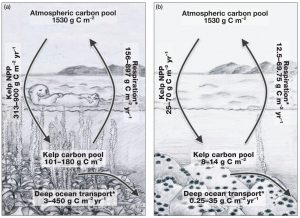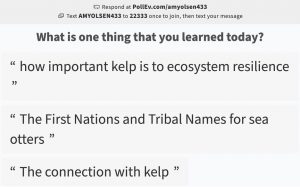How can sea otters help mitigate climate change impacts?
Kelp, urchins, carbon, indigenous participation, and reintroduction are part of the answer. Read about my event of short engaging lightning talks in fulfillment of the UW PCC Graduate Certificate in Climate Science.
Written by: Amy Olsen

ecosystems
Sea otters (Enhydra lutris) are a small mammal in the weasel family. They are a keystone species, which means they have a big impact on keeping their ecosystem balanced. They are primarily found in kelp forests, which are underwater forest-like systems, home to many species. Sea otters eat sea urchins (Strongylocentrotus spp), which are voracious invertebrate herbivores that graze on kelp. If urchin populations grow unchecked, they can graze down a kelp forest very quickly, called a trophic cascade. When enough sea otters are present, they have been found to keep the numbers of sea urchins down, preventing severe overgrazing (Estes and Palmisano, 1974). Kelp forests have been found to sequester, or hold onto, carbon in the marine environment. Because of the high rate of uptake of atmospheric CO2, it has been hypothesized that sea otters might increase the rate
of carbon sequestration through their positive indirect effect on kelp (Wilmers et al., 2012).

To communicate the science behind these concepts to a wide and diverse audience, I hosted a virtual Lightning Talk event with my employer, the Seattle Aquarium. A lightning talk is a very short presentation (5 minutes) and requires the presenter to be brief, clear and succinct. This can be done in a creative and captivating way, leaving audiences with one or two main take away points.
The main objectives of this project were to:
- Digest climate science so that it is accessible to a wide audience
- Articulate climate change through an animal lens
- Spotlight the multiple ways in which climate change will impact the marine environment
- Evaluate whether the science was communicated effectively
In 2020, the Seattle Aquarium transitioned its Lightning Talk event to a virtual format. Not only can a wider audience be reached, but speakers from throughout the world can participate. These lightning talk events are widely accessible to all with an internet connection. The talks are catered to a wide range of ages and no science background is required. The events are designed to directly align with the Aquarium’s mission, to inspire conservation of the marine environment.
The Lightning Talks: Sea Otters event occurred on Earth Day, 4/22/2021 from 6-7pm PT on YouTube Live. Registration occurred through the Seattle Aquarium website, and was advertised in multiple ways (facebook ads, Seattle Aquarium members, staff and volunteers, UW SMEA department listserv, UW PCC listserv, etc). The final registration number was 1,005 people. During the event, we received 395 chat messages in the YouTube live chat and had 364 concurrent viewers at the peak. After the event, there were >1,000 views of the YouTube video within 12 hours. By the submission of this blog, there were 1,336 views. The video link was shared 53 times. The Seattle Aquarium lightning talks are recorded and available to watch for free on YouTube. They will remain accessible to anyone who wants to watch them in the future. https://www.youtube.com/watch?v=gZmiqJ12Mms
At the beginning and end of the event, I conducted a survey using PollEverywhere to learn more about the audience and to gauge the effectiveness of our climate communication.

For the survey, 224 people participated out of a potential of 364 viewers (61.4%). Many of the participants equated the term climate change negatively (i.e. disaster), and due to their own self reporting of knowledge, many were relatively well-versed in what climate change is. Most of the participants go so far as to consider climate impacts when they make decisions in their personal lives. What participants desired most out of the event was to learn and connect. They wanted to learn about how they can help, to feel inspired, and to connect with other like-minded people. What participants took away was the deep connection between kelp forest ecosystems, urchins and sea otters as a keystone species.

I believe my capstone project was successful in accomplishing all of the learning objectives. I worked with each of the speakers individually to highlight that our audience tends to be very diverse, with multiple backgrounds, education levels, ages and experiences. The presentations needed to be accessible, with no jargon and no assumptions that the audience has any background knowledge in what they are speaking about. I believe the speakers did an amazing job at articulating climate change through an animal lens, and they highlighted multiple ways that climate change will impact the marine environment and how sea otters can help mitigate those changes. The survey itself showed that people learned something new that they had not known before. Overall, I think the capstone project was quite successful and has received lots of great feedback.
Amy Olsen is a second-year masters student of the School of Marine and Environmental Affairs and completed this capstone project for the Graduate Certificate in Climate Science. Her thesis focused on the impacts of a marine heatwave on coral reef fish communities on the Big Island of Hawai’i. She currently works as a research technician at the Seattle Aquarium where she assists with on-going conservation research projects spanning rockfish surveys, sea otter foraging, endocrinology, microplastics and coral reef monitoring.